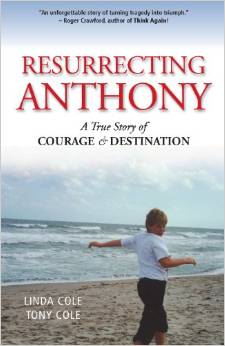With all the information available, why do caregivers still struggle to navigate the medical system?
From the patients’ point of view–
- Why do communications break down between doctors and patients?
- Why do patients feel their concerns are not fully understood?
- Why do patients and their families wait agonizingly for doctors to call back?
Linda Cole, co-author of Resurrecting Anthony: A True Story of Courage and Destination, writes about one small piece of an overwhelmingly and seemingly impersonal health care system as she tries to get the best medical care for her son.
(Although, The Caregiver’s Voice focuses on elders, the Coles’ experience with their child who is now a young adult is helpful for caregivers of cognitively-impaired adults trying to navigate the medical system. The story below has been slightly edited. TCV Ed.)
Dental Surgery for Anthony
It has been nearly thirteen years since our young son, Anthony, suffered cardiac arrest. A lack of oxygen during the resuscitation left him severely brain injured, fully dependent, and largely disoriented. While it hasn’t been easy, and probably never will be, we have shaped a new life and family around the person that he has become.
However, the challenges continue as his needs change, doctors retire, insurance denies coverage of certain medications and supplies.
Our latest hurdle is to have a cavity filled (his first ever) and a front tooth removed and a new one implanted after being traumatized while he was being resuscitated over twelve years ago.
Because he’s an adult (by age only), he is no longer seen by Children’s Hospital for dental. He was referred to another hospital for this specialty. However, they have done nothing more than dental cleanings. Meanwhile, both the dentist, who will be filling the cavity, and the surgeon, who will be removing the tooth and anchoring the base for the implant, wish to do the procedures without anesthesia.
Anthony understands enough to recognize potentially painful situations and will be nervous. This will contribute to his natural inclination to startle and jump uncontrollably and spontaneously. While Anthony will try to cooperate with these doctors who have only consulted with him, they are unprepared for his startle reflex, which could complicate his treatment.
I’ve tried to involve his rehab physician at Children’s but she’s continually on inpatient rounds and unavailable. I suspect she is reticent to prescribe medication that should be recommended and administered by those who are doing the procedures (and less familiar with Anthony).
Over the years I have witnessed continual problems with medical specialists’ lack of communication and collaboration. I’ve also learned the only way to effectively address these problems is to act as the bridge, which I do only adequately and with limitations.
You would think that, prior to a consultation appointment, the dentist would ensure the transfer of x-rays to the surgeon also located within the same hospital. Anthony’s did not arrive in time for our appointment.
Lessons learned
Request and bring x-rays to consultations. Do not depend on the medical facility to transfer films or other records.
Soon I hope that technology will allow information to be exchanged better between providers.
Since I am the person who knows my son best and cares about him most I need to call ahead to make sure everyone involved in Anthony’s care:
- has his current records in their office;
- knows as much as possible about my son; and
- thinks through the ramifications of each procedure.
Our lives as caregivers are complicated and multi-faceted, but we are not powerless.
Often we are responsible for the physical care, supplies, medications, appointments, and insurance for our loved ones. Yet we must do our best to bridge the communication gaps that exist within the medical community, which occur as time creeps forward and new situations and doctors, different venues, and additional procedures arise.
Adaptability, tenacity, resourcefulness, and assertiveness are precious assets in a caregiver; behaviors that contribute to a better quality of life for our loved ones and better outcomes for both the patient and caregiver.
![]()
 Linda Cole co-authored Resurrecting Anthony: A True Story of Courage and Destination (January 2011) with her husband Tony. Told through a father’s eyes, it details the first 24 months of son Anthony’s treatment and illness after he suffered cardiac arrest and brain injury at the age of twelve. The book includes information on living through a crisis, dealing with paperwork from hospital and insurance bills, and a directory of resources.
Linda Cole co-authored Resurrecting Anthony: A True Story of Courage and Destination (January 2011) with her husband Tony. Told through a father’s eyes, it details the first 24 months of son Anthony’s treatment and illness after he suffered cardiac arrest and brain injury at the age of twelve. The book includes information on living through a crisis, dealing with paperwork from hospital and insurance bills, and a directory of resources.








